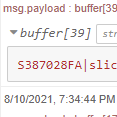SmartSDR v4.1.5 | SmartSDR v4.1.5 Release Notes
SmartSDR v3.10.15 | SmartSDR v3.10.15 Release Notes
The latest 4O3A Genius Product Software and Firmware
Need technical support from FlexRadio? It's as simple as Creating a HelpDesk ticket.
Best way to setup a remote 6400 for club users?

My 6400 is remote controlled and it's working fine. However, I have been asked to assist setting up a 6400 for access by club members.
My setup is simple and I use SmartLink, which is fine for me.
If the club wants to set it up so that members can log-in, is SmartLINK still the best approach, or should we opt for a VPN + NUC at radio site + SmartSDR app?
The plan is to have authorized club members install SmartLINK on their computers (or SmartSDR if option B) and connect to the licensed radio up on the mountain. I am not concerned about acccess control as that's handled by the club. The mountain top location will be climate controlled (up to a point).
As for the connection, the remote will be connected to a fast internet link via a dedicated high-speed point-to-point microwave link (mountain top to base).
So ... SmartLINK on the local computer, or VPN + SmartSDR running on a NUC computer at the radio site?
Option 1: SmartLINK on local ham's computer --> Internet to bridge --> microwave link --> 6400
Option 2: Internet to bridge --> microwave link --> VPN on NUC and running SmartSDR --> 6400
Looking forward to your recommendations
Comments
-
We use both options:
Normal users will start the Station ( power and antenna/beam controls via Web App ) . Then they access the radio via smartsdr. Unfortunately there has never been any option for real multiuser with leveraged acces, password per user etc. ( Even though this was promised to us on a show booth , when we bought the radio in 2019 ). Anyway it works perfect.
The internet is connected to my highspeed DSL and goes to the clubstation via 5ghz 100mbit link.
Alternatively there are users who can access my network via VPN ( softethernet ) and use smartsdr without smartlink. This works even when smartlink has a quirk and does not want to connect . This is even worse..securitywise.. as these are in my private network. Alternatively one can setup a VLAN for sor such only. Better in this case: every user has his own vpn account and password..so i can lock them out one by one , in case of need.
The 3rd option in use is that also a few users can connect to a PC at the clubstation site and use smartsdr . This makes sense only for some digital applications or for updating etc. to ensure a very tight link between PC and Flex.
All together , i would NOT really recommend such for a large community as smartsdr/smartlink is not made for multiuser at all..and i guess it will never ever be..
My own FTDX101D is available to the public via remotehams and there the multiuser scenarios are close to perfectly managable. You should really think about that instead of smartsdr for a larger club community.
Currently we have about a dozen users and 4 of them are really actively using the radio each day.
dl9ndw,dl0hof,dh0f
0 -
In addition..
we use teamviewer or lmviewer for acces to the pc at the site, which must be started each run.
Another thing to take into account.. not every user will be able to understand all the details around smartsdr, networking etc. etc.. so be prepared for a lot of work once you pass the credentials around..
Harry
0 -
There is another option. You should try it before deciding. You can use the RCForb server software to provide access to the Flex. Then users can install the RCForb client software on their own PC or Android device. You can read more about this on the remotehams.com site. link here for ease. http://www.remotehams.com/
Don't confuse this with the paid service called remotehamradio.com it is not the same.
This would require a computer at the Flex site and someone to administer USER login access and permissions. In my experience, it works very well for many radios and allows a significant amount of control over user activity and access by the remote manager. I have not used it on my Flex for several years so I am not up to date with how well it works with the Flex with today's software versions.
If you want to see how it works you can download the RCForb client software on your computer and between 5am and roughly 7:30 am Eastern USA time you can connect to the WB2REM link in the list of available remotes and find that Jim (WB2REM) is quite accommodating with allowing new users to listen and transmit on his remote during this time. It is not unusual during his sessions each morning on the remote to have a half dozen or so user connected at the same time.
0 -
Based on the way the technology is today, I would:
- Run a PC local to the radio
- Give users a login to the PC
- Install all Ham Radio apps on the local PC - this gives you the advantage of only 1 PC to support. You don't want to be the support person of all the users PCs. They just need to know how to use some sort of remote desktop program.
- Let users install and run SmartSDR via SmartLink - common login
- Run a few training sessions.
This explains some of my reasoning and part of the KISS principle.
Some other clubs I know are doing it this way.
0 -
Thanks for the feedback ... some comments:
- The radio site will up top a mountain near the repeaters so no "local ham shack". Only remote ops.
- The housing is climate controlled (up to a point)
- The link to the Internet is via a club built/owned, high speed microwave link. It will connect to Spectrum or other HSI provider.
- We will have a NUC up there so that we can manage the Flex on the LAN side. We will also have Web managed AC power (Web Power Switch! - 15 Day Free Trial! - Ships Overnight - From $149! (digital-loggers.com). This is what I use at my remote stations. I love the built-in scripting capability (LULA language) as I created routines to reboot if links are lost, sequential and timed power cycling to let each device shut down properly, etc.
- We will have remote antenna disconnects to both the center and shields
So as I understand it, either we use SmartLINK for all (and help the users setup their computers), or make sure that the NUC at the radio site is powerfull enough, and setup a VPN / virtual VPN so that the users can use SmartSDR and connect to the radio via the VPN.
By the way, I remotely access my NUC using my "RemotePC" subscription. I use this for two other computers over here so I had an extra license available. Been very reliable.
------------------------
Mike - I like your approach and the NUC at the radio site will be capable (industrial grade).
Per my understanding, the users would use SmartLINK to connect to the Flex, but remotely access the local NUC for other apps. So they will need remote access via virtual VPNs like RemotePC, LogMeIn, etc.
However, if we use a NUC and virtual VPN, then why do the need to use SmartLINK? They would connect to the NUC at the radio site and run SmartSDR on the LAN side. The only advantage of SmartLINK is that they can have their own configurations. If SmartSDR runs on the NUC computer, then any change by one user will affect the subsequent users.
If the users install SmartSDR in this configuration and connecing via a virtual VPN, I assume that they won't need to use SmartLINK, but we will need to provide instructions and training on how to setup their connection.
Do you suggest that the FLEX always remain powered or that it 's turned OFF after use (using tyhe right method)?
I ask as the WPS7 I use turns OFF DC power to the flex after the Flex has shutdown properly. Never had an issue.
I do this as my remote is in Florida and we want to turn everything off and remotely disconnect everything when a thunderstorm is nearby (almost every summer day)
--------------------------
Ha Gei - We suspect that some hams will find this too complicated, but then again, most will be OK. We would love to cater to all but if a user doesn't want a computer-based UI, then so be it.
--------------------------
John - We will look at the RCForb server and clients ... but wil it work with the FLEX-6400? I checked out the info at the link you shared, and either I missed it, or there is no mention fo support for the Flex-6400.
0 -
Mike - I just did more in-depth resaarch on RCForb and I do see that they support the Flex. However, this software is still at "alpha" stage (v0.9).
If it were just for me, I have no problem using it. However, I am hesitant to use an "alpha" for hams in our club as many might not be that computer savvy. It's "alpha", but how "stable" is it?
0 -
RCForb works great with SmartSDR on the Flex Radio's, and use it on our club remote.
RCForb has been in Alpha for many years and I have used it for at least the last 9 years on the legacy and recently (4 or 5 years now) the 6000 Flex Radios.
As far as being Stable, it is very stable much more then Windows is, and works very well with both Windows and Android Clients.
0 -
Mike - I like your approach and the NUC at the radio site will be capable (industrial grade).
Per my understanding, the users would use SmartLINK to connect to the Flex, but remotely access the local NUC for other apps. So they will need remote access via virtual VPNs like RemotePC, LogMeIn, etc.
However, if we use a NUC and virtual VPN, then why do the need to use SmartLINK? They would connect to the NUC at the radio site and run SmartSDR on the LAN side. The only advantage of SmartLINK is that they can have their own configurations. If SmartSDR runs on the NUC computer, then any change by one user will affect the subsequent users.
If the users install SmartSDR in this configuration and connecing via a virtual VPN, I assume that they won't need to use SmartLINK, but we will need to provide instructions and training on how to setup their connection.
Do you suggest that the FLEX always remain powered or that it 's turned OFF after use (using tyhe right method)?
I ask as the WPS7 I use turns OFF DC power to the flex after the Flex has shutdown properly. Never had an issue.
I do this as my remote is in Florida and we want to turn everything off and remotely disconnect everything when a thunderstorm is nearby (almost every summer day)
Good question.
You will want to use SmartLink to give the best user experience. The user will run SmartLink on their local PC and that will handle their PTT and Audio connections.
Attempting to run audio through the RDP software can be a bit more problematic.
You will want to test both configurations.
One thing I forgot to mention that when you use an Remote Desktop, you always want to make sure that you continue to PLAY audio on the LOCAL computer --- in your case, this would be the NUC. Otherwise, the audio captures mess up things.
I leave my radios powered 7x24. I have since 2013.
As for Thunderstorms, there is no application that yet throws the coax out the window. :) But, I do power down pretty much everything when I know a thunderstorm is possible.
Mike
1 -
Just to confirm, Mike.
- Install a local PC at the remote site (I've just purchased a Geekom Mini IT8 for this purpose).
- Access this using something like RDP, but with audio not fed back.
- Run SmartSDR and all the digital modes on the remote PC
- Run SmartSDR on the Home QTH server and use FlexLink to access the Flex for voice modes and CW.
0 -
"As for Thunderstorms, there is no application that yet throws the coax out the window. :) But, I do power down pretty much everything when I know a thunderstorm is possible."
Mike,
Let me know when software engineering designs that coax throwing API!
0 -
I echo what Bret WX7Y says about RCForb. I have used it about the same amount of time and very stable .
John K3MA
0 -
Install a local PC at the remote site (I've just purchased a Geekom Mini IT8 for this purpose).
Access this using something like RDP, but with audio not fed back.
Run SmartSDR and all the digital modes on the remote PC
Run SmartSDR on the Home QTH server and use FlexLink to access the Flex for voice modes and CW.
- Yep
- correct -- you want to keep the audio at the radio end
- perfect
- you got it
Hand sending CW is a bit of a challenge without a Maestro, but there are some cool solutions discussed here in the community using WinKeyers.
73
0 -
What's the recommended computer configuration? We are using a NUC with the following:
- Intel i5-3337U @ 1.8 GHZ, w/8GB, 256 GB SSD
It's configured and running at the remote site but it's sluggish. The internet link is microwave from the radio site on the mountain to the Internet hub, with ~30 Mbps u/d, jitter ~6 ms, ping ~14ms
0 -
I just saw this thread and it sounds like you have committed to your strategy.
I wanted to advise how our club has been remotely accessing a Flex 6400 since 2019. We are using internet access to control the radio on/off functions and user authentication. We have a Raspberry Pi that runs Node-RED for control and client information. We use Nginx as a reverse proxy with basic authentication for users. Since we have a domain we access the server with https protocol. Each user runs SmartSDR remotely. The Node-RED dashboard board also show lightning strikes within a 25 mile radius.We use a mechanical actuator on a track that connects the coax when the radio is on. The accy port on the radio provides 5 volts to operate the relay.
I have not implemented any automated disconnect when lighting occurs. It would be simple to set it up but so far our operators know to shut the radio off when the lightning alerts. This disconnects the coax from the radio to the antenna.
Let me know if you would like additional information on our setup.
regards0
Leave a Comment
Categories
- All Categories
- 383 Community Topics
- 2.1K New Ideas
- 640 The Flea Market
- 8.3K Software
- 147 SmartSDR+
- 6.4K SmartSDR for Windows
- 188 SmartSDR for Maestro and M models
- 435 SmartSDR for Mac
- 274 SmartSDR for iOS
- 262 SmartSDR CAT
- 201 DAX
- 383 SmartSDR API
- 9.4K Radios and Accessories
- 47 Aurora
- 280 FLEX-8000 Signature Series
- 7.2K FLEX-6000 Signature Series
- 958 Maestro
- 58 FlexControl
- 866 FLEX Series (Legacy) Radios
- 935 Genius Products
- 466 Power Genius XL Amplifier
- 343 Tuner Genius XL
- 126 Antenna Genius
- 305 Shack Infrastructure
- 214 Networking
- 464 Remote Operation (SmartLink)
- 144 Contesting
- 796 Peripherals & Station Integration
- 142 Amateur Radio Interests
- 1K Third-Party Software




